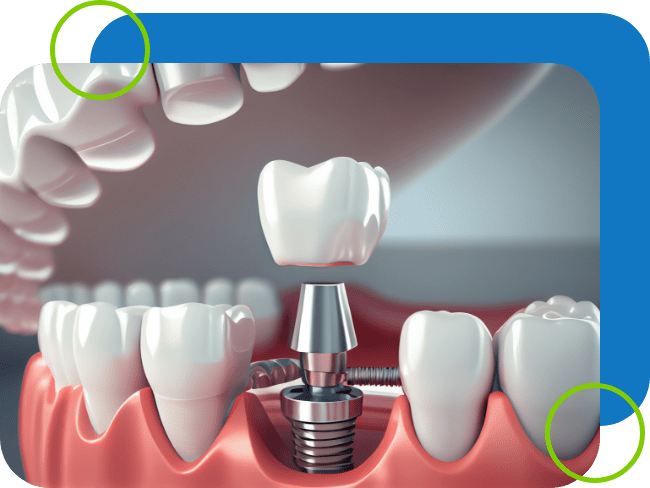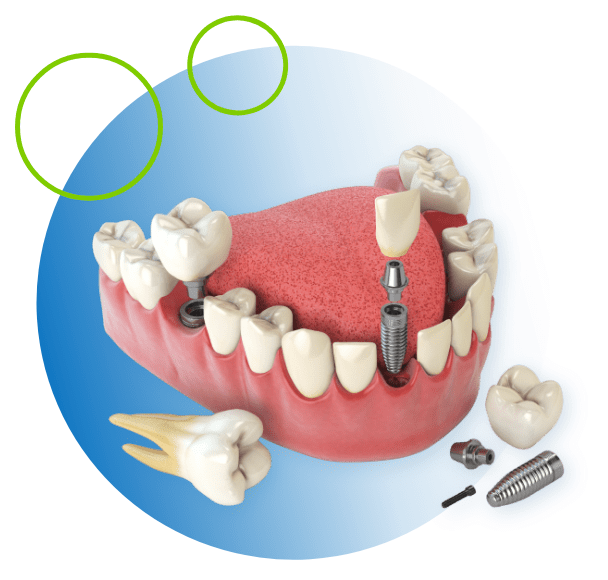Dental Implants
Dental Implants
Implants are the most popular and one of the most ideal solution for replacing missing teeth.
A dental implant is basically a titanium post which is surgically implanted into the jawbone and works as a tooth root. Post insertion, an implantologist attaches a crown on top of the implant to ensure the appearance of a tooth.
They simulate a natural tooth in every way.

Why Go For A Dental Implant?
- Problems in speech resulting from the gap created by missing teeth.
- Difficulty in chewing hard or soft food.
- Face may start to look old, wrinkled with sunken cheeks as it causes sagging of muscles as teeth cannot support the lips and cheeks
- Pain in the jaws may result in improper bite induced by missing teeth.
- Decay of tooth and gum disease, plaque accumulation and food entrapment in the gap caused by missing teeth.
- Improper biting habits resulting from misaligned teeth due to the missing tooth.
- Affects self-esteem and people tend to hide their smiles.
Dental implants help to overcome all the above problems. They are the best possible mode of treatment for missing teeth. It is fit for every individual unless directly contraindicated.
They have a high success rate and assures the well-being of patients.
Advantages Of Dental Implants
- They help restore the lost tooth, simulates natural tooth in its color, shape and position.
- Extremely durable.
- They help to maintain the contour of the face, prevents sunk cheeks and muscle sag.
- Implants do not harm the adjacent teeth structure in any manner.
- They ensure comfort and well-being of the patients.
- They impose no limitation on the patients and one can enjoy all sorts of hard or soft food after getting an implant.
- Usually does not create a problem with MRI as Implants are made up of Titanium, which is a Non Ferromagnetic Metal.

Procedure
The procedure of placing an implant is pain free. It is done under anesthesia. The procedure starts with preparation of the jawbone. The jaw bones are exposed, and holes are drilled. The holes are kept deep enough for the implant to be placed properly and deep into the bone, like the root.
The doctor may graft bones in cases where the bone is weak or lacks the strength to support implant surgery. The surgeon then waits for the jawbone to heal before putting the metal post in it.
The entire process may take months as the healing process is slow and new bone has to grow and support the placement of the implants.After this, a temporary crown is placed for aesthetic and functional requirements. This is called as the abutment. During this procedure, the dentist will re-open the wound to attach the abutment to the dental implant. The temporary crown is given for 4-6 weeks to let the gums heal. These crowns are usually softer, it cushions the implant and prevents stress on the soft tissues which helps in healing.
When the bone completely heals, the crown is taken off and a replacement crown is placed. The replacement crown is similar to natural teeth. It takes less than 2 to 3 weeks to make a permanent crown which is then cemented or screwed to the implant.
Post-Operative Instructions For Dental Implants
- Avoid touching, spitting, and rinsing the wound on the day of the surgery. One should not touch the metal abutment jutting through the tissues of the gum.
- It is normal to have bleeding or redness in the mouth for 24 hours. To control excessive bleeding, bite on a gauze pad for 30 minutes. If the bleeding does not stop, immediately call our office.
- Swelling is natural after surgery. To minimize swelling, apply an ice pack over the swelling for the first 36 hours.
- Drink lots of fluid. Avoid hot beverages. Stick to a soft diet on the day of surgery. Do not suck on a straw.
- Start taking pain medications as prescribed by the dentist.
- Use prescribed oral rinse, maintain proper oral hygiene after breakfast and before bed. Rinse for at least 30 seconds. Warm saline rinses for 4-5 times a day should be done as well.
- Do not consume tobacco products in any type or form. It increases the chances of implant failure.
- Do not use partial or full dentures or flippers immediately after surgery. Ask for dentist’s advice regarding such matters.
Post Implant Care
- Brush twice a day to maintain oral hygiene.
- Use a toothbrush with a small head and soft bristles.
- Change your toothbrush after every two or three months to not let frayed bristles harm your teeth and gums.
- Do not use too much force while brushing teeth as it may cause abrasion.
- Floss at least once a day to keep plaque and bacteria at bay.
- Use mouth rinses once a day as prescribed by your dentists.
- Do not eat sticky food as it may affect healing.
